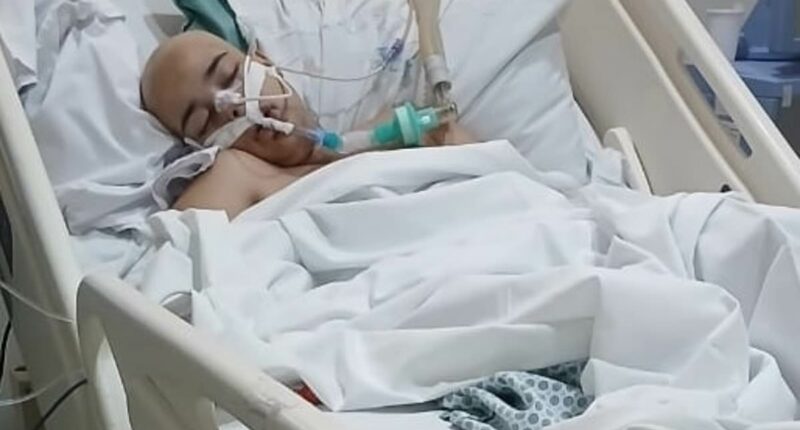Share this @internewscast.com
A young mother of two was devastated to discover her body was overwhelmed by a rare cancer compressing her internal organs—ironically, she attributes her survival to contracting a hospital-acquired infection.
Rafaela Ribeiro, 24, shed nearly three stone in just weeks earlier this year, but thought she was simply losing weight.
She said: ‘I thought everything was fine, that I was just losing weight very quickly.
‘I never imagined it would be anything more serious.’
Initially dismissed as pneumonia or an allergic reaction, Ms. Ribeiro, an estate agent and influencer in São Paulo, Brazil, was eventually diagnosed with an uncommon and aggressive form of cancer known as B-cell non-Hodgkin lymphoma, which affects the lymphatic system.
She said: ‘It started with a constant dry cough and then came the swelling in my neck and armpits.
‘A few days later, I could no longer swallow anything solid because the tumour was squeezing my chest.’
Non-Hodgkin lymphoma is a cancer which usually starts in the lymph nodes.

Rafaela Ribiero with her husband Michell and their two young sons


Miss Ribiero was diagnosed with cancer at just 24
Stats shared by cancer charity Macmillan cite that nine out of 10 people diagnosed with have a B-cell lymphoma, which forms in white blood cells.
Despite medical professionals initially overlooking her symptoms, it wasn’t until she collapsed and lost her ability to eat that scans showed her upper body was filled with tumors.
She said: ‘The tumours were crushing me from the inside.
‘My oesophagus was compressed, and my heart felt like it was being taken over, but it was just the pressure from the tumours.’
Ms Ribiero began chemotherapy, but during treatment contracted a deadly hospital superbug.
She was placed in an induced coma for nine days as doctors warned her husband, Michell, that she might not survive the night.
She said: ‘They told my husband I could die within 24 hours. Miraculously, I survived.’
The coma, she believes, actually saved her life.

She was placed in an induced coma after contracting a hospital bug

This x-ray shows how tumours were ‘crushing’ her internal organs
She said: ‘This period of fasting helped me achieve remission.
‘If I hadn’t caught this infection and ended up in a coma, they might not have been able to control the disease.’
Now in remission, Rafaela is awaiting cutting-edge CAR-T cell therapy—an immunotherapy that trains the body’s own cells to destroy cancer.
CAR T-cell therapy, a type of immunotherapy, utilizes a patient’s immune system to battle the disease effectively.
There are several types that work in different ways to help the immune system recognise and attack cancer cells.
With CAR T-cell therapy, immune cells called T-cells are engineered to seek out and destroy cancer cells.
The process of making these weaponised T-cells is lengthy, complex and expensive.
This procedure starts by connecting the patient to a machine similar to one used for kidney dialysis, which extracts a blood sample, isolates the T-cells, and returns the remaining blood back into the patient’s body.

She thanks her husband for getting her through the darkest chapters of her cancer fight

She credits the coma for saving her life, believing it gave her body a chance to fight the cancer
The machine repeats the process until it has collected 200ml of T-cells, which can take six hours.
In the laboratory, these T-cells are modified to seek out and eliminate the cancerous cells. This is achieved by using an inactivated virus to implant genetic material that instructs the cells to produce a chimeric antigen receptor (CAR) protein that can identify a unique protein present on the cancer cells.
The supercharged T-cells are then multiplied in the lab, before an infusion of 200 million cells is delivered to the patient via a drip, which takes just two minutes.
The cells should then home in on, and kill, cancer cells that have the protein they’ve been engineered to recognise.
She said: ‘Today, the disease is stable; it’s still present, but it’s under control.
‘I’m on the waiting list for cell therapy.’
Ms Ribiero credits her husband—with whom she shares two sons aged eight and two—for helping her throughout her cancer battle.
She said: ‘He was the one who held it all together.
‘I don’t know how I would have gotten through it without him.’

















